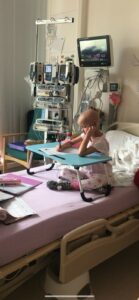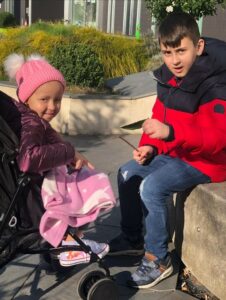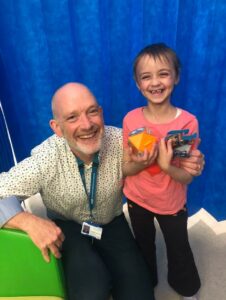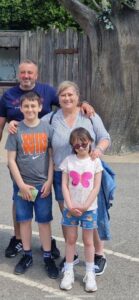Pioneering research in Manchester has shown dramatic results for treating children with high-risk leukaemia (a type of blood cancer), who previously had no hope of recovery after all other treatment options had failed.
The success of the innovative treatment is down to the help of newborn babies, as the cord blood cells taken from the placenta (afterbirth), along with a series of white blood cell transfusions, provides the most effective treatment ever trialled.
 Eight-year-old Sarah was just four years old when she was first diagnosed with acute myeloid leukaemia (AML), a rare type of childhood leukaemia which is diagnosed in approximately 100 children and young adults in the UK each year.
Eight-year-old Sarah was just four years old when she was first diagnosed with acute myeloid leukaemia (AML), a rare type of childhood leukaemia which is diagnosed in approximately 100 children and young adults in the UK each year.
After all other treatments failed, including chemotherapy and a bone marrow transplant, Sarah from Cornwall travelled to Royal Manchester Children’s Hospital (RMCH), part of Manchester NHS Foundation Trust (MFT), to receive the innovative treatment through the GRANS clinical trial. Now over one year in remission, the team at RMCH and her family are hopeful that this novel treatment will have cured the leukaemia.
Sarah was one of ten children in the two-year study, to receive a cord blood stem cell transplant alongside a series of white blood cell transfusions (known as granulocytes) with the aim of boosting the cancer fighting abilities of the new cord blood.
Sarah’s story
Sarah’s mum, Simona Marica, 44, a staff nurse in Cornwall, said: “When I heard the doctor first diagnose Sarah with leukaemia I started crying at the word, but even worse, we were told this was a rare, harder to treat leukaemia. She had to start chemotherapy immediately as her blood results were so bad, she could have died at any time.
“After finishing six months of chemotherapy in Bristol, she went into remission, and we were going back to a kind of normal life. That was in 2019, but in February 2020 the leukaemia returned. She had more chemotherapy and fortunately our ten-year-old son David, was a bone marrow match and donated this to Sarah, who had stem cell transplant and went into remission for 18 months”.
It was when Sarah was on chemotherapy for the third time that doctors in Bristol discussed the potential for Sarah to take part in the GRANS study at RMCH.
 Simona continued: “I knew that a second transplant would be the last. As a nurse, I knew that nothing more could be done if the leukaemia came back again because her body would not be able to tolerate any more chemotherapy, or further treatments. I knew this trial was her last chance of life.”
Simona continued: “I knew that a second transplant would be the last. As a nurse, I knew that nothing more could be done if the leukaemia came back again because her body would not be able to tolerate any more chemotherapy, or further treatments. I knew this trial was her last chance of life.”
The initial results from the study have been published in the British Journal of Haematology and the trial has been expanded to recruit more patients from across the UK following the promising results so far. Researchers are also looking into the science behind this treatment, to better understand how and why this treatment works.
Professor Rob Wynn, Consultant Paediatric Haematologist and Director of Paediatric Bone Marrow Transplant Programme at RMCH, part of MFT said: “We know from our previous research, reported in the Blood Advances journal, that cord blood cells offer the most effective treatment for children with hard-to-treat blood cancer.
“The GRANS clinical trial builds on this research and provides a treatment option for the sickest of children with AML, where no treatment options have been available.
“Sarah is one of five children from our trial who are alive and in remission as a result of this effective, experimental treatment. Without this clinical trial, it is unlikely that any of the children would still be alive.
“As a world leading transplant centre, we have the capability to carry out this specialist and transformative research for children across England and to share these remarkable results.”
Now that Sarah has been in remission for over one year, the family is finally putting the pain of the last few years behind them to concentrate on the future. This summer they are looking forward to enjoying a holiday in France with friends and experiencing normal family life.
Simona said: “I’m so glad Sarah has been part of the trial, Professor Wynn and the whole team made us feel like family, they looked after us so well and they are truly doing amazing things.
“Sarah has been through so much over the last few years, but she has been so brave. She has been my rock and she is such a cheerful, determined girl who loves school and playing with her friends.
“As a result of this research, Sarah is now fully enjoying life. She is my inspiration, and this treatment has given us all our lives back.”
The science behind the treatment
Granulocytes have historically been given to patients with serious infections at the time of the transplant, to help the body’s fight against infection. However, researchers at RMCH noticed where granulocyte transfusions were given during the early days after a cord blood transplant, the immune cells, known as T-cells, of the cord blood recovered much more quickly. Furthermore, it’s T-cells that are known to best kill leukaemia cells.
In the GRANS study the children were given seven transfusions of granulocytes around the time of their transplant. Uniquely they were given to the children even if they did not have a serious infection – to deliberately increase the number of cord blood T-cells. The researchers were looking at the effect of the white blood cell transfusions on the immune system recovery of the new cord blood.
Alongside the study, researchers have been conducting laboratory investigations, funded by The Little Princess Trust, with expert support and grant management from Children’s Cancer and Leukaemia Group (CCLG), to learn more about the cord blood T-cells, how they respond to the granulocytes and to understand how they might be better at getting rid of leukaemia.
Phil Brace, Chief Executive of The Little Princess Trust, said: “As one of the UK’s largest charity funders of childhood cancer research, we are committed to supporting research and trials that improve patient outcomes.
“The magnificent progress made by Professor Wynn and his team in Manchester, and the incredible bravery shown by Sarah and her family, inspire us all to continue focussing our efforts on funding science that will lead to kinder and more effective treatments for all childhood cancers.
“We are very grateful to our supporters who ensure we can fund clinical trials and I am so proud to see research funded by The Little Princess Trust bringing about such incredible results.”
Research into cord blood transplants to cure AML
Cord blood is the blood that remains in the placenta and umbilical cord of newborn babies and is rich with stem cells and is a treatment option for children with AML when chemotherapy has failed.
Cord blood transplants are only given when all other treatment options have been exhausted due to the risks, including graft versus host disease (GVHD), which occurs when the donor immune cells attack a patient’s healthy cells. This can be a serious complication of the transplant and in some cases can be life-threatening.
Research, led by the team at RMCH found that children receiving a cord blood transplant, where chemotherapy was unsuccessful, were almost five times more likely to be disease-free and GVHD-free compared to children who received other stem cell transplant options.
Professor Wynn continued: “In Manchester we have been strong advocates for using cord blood because it is clear from our research that this type of transplant provides the best outcomes for our patients.
“The number of cord blood transplants has been reducing in the UK because in comparison to bone marrow transplants, it is more difficult to carry out and makes children very poorly, with extended periods in hospital. As a result, children are often referred to us from other hospitals across the country.
“Our next steps are to conduct further work to better understand how this immune effect of cord blood and granulocytes works, so we can refine it, and further optimise it to cure children with difficult to treat leukaemia.”
While the placenta and umbilical cord are normally discarded post-birth, cord blood is collected and stored in dedicated UK sites. NHS Blood and Transplant (NHSBT) and Anthony Nolan, a UK charity, work closely, managing donor databases.
NHSBT’s dedicated and expertly trained staff collect cord blood donations at two hospitals in London and one in Luton. They also supplied the cord blood units for the transplants and the granulocytes – a blood product that includes white blood cells from ten donors, pooled into a single product, used in the GRANS study.
Anthony Nolan manages cord collection sites at Saint Mary’s Hospital on Oxford Road and Saint Mary’s at Wythenshawe, both part of MFT, which are two of the five UK locations where parents can donate the placenta and umbilical cord of their baby to the charity, for stem cell donation or research.
Henny Braund MBE, Chief Executive at Anthony Nolan said: “Anthony Nolan’s cord blood programme was established in 2008 to help meet the unmet need of patients. This research provides much needed answers for children with fewer treatment options; we hope this opens the door for further research, which will help save more lives in the future.”
Guy Parkes, Head of Stem Cell Donation and Transplantation at NHS Blood and Transplant, said: “NHSBT supplied some of the cord blood units for the transplants and the granulocytes – a blood product that includes white blood cells from ten donors, pooled into a single product. We are proud to support this key research which highlights the important role and benefit of cord blood and blood products as a treatment option and supports our continued investment in maintaining the UK’s largest public cord blood bank.”